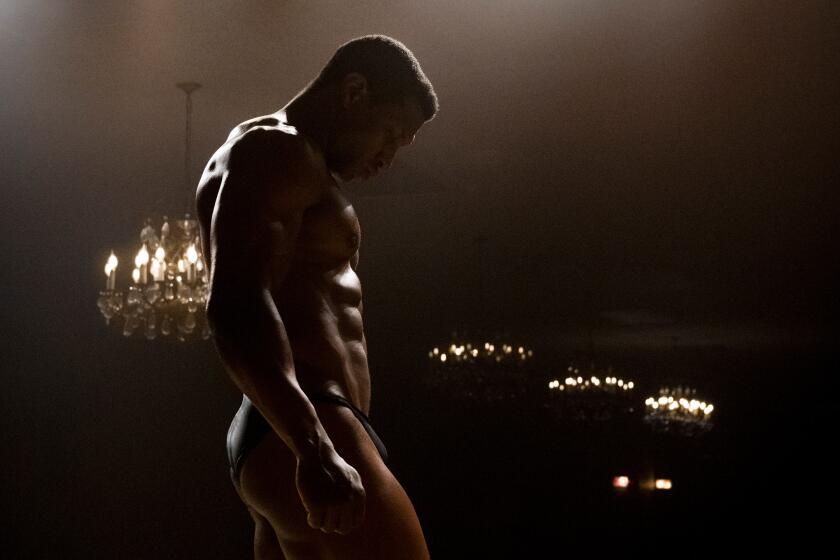‘Miles Davis: Birth of the Cool’ sees jazz legend with empathy and honesty
- Share via
In the first 20 minutes of the terrific new documentary “Miles Davis: Birth of the Cool,” we see the jazz legend grow up in St. Louis, move to New York, enroll at Juilliard, join Charlie Parker’s band, marry classical textures with bebop on the landmark album from which the film takes its title, fall in love with Juliette Gréco, get hooked on heroin and then kick the habit.
That’s a movie in and of itself. Davis contained multitudes, changing jazz many times over with his endless innovations and reinventions. The extraordinary thing about Stanley Nelson’s documentary is that it captures all the beauty and ugliness of Davis’ life, explaining how he relentlessly pushed jazz forward and the costs that came with that single-mindedness. To quote Davis: “Music is a curse. It comes before everything.”
Davis’ words are heard throughout “Birth of the Cool.” Essentially, he narrates the movie with Nelson employing actor Carl Lumbly to read portions from Davis’ candid autobiography in the musician’s distinctive rasp. Lumbly isn’t the only one imitating Davis in the film. Just about everyone interviewed here — and it’s an illustrious lineup that includes the likes of Herbie Hancock, Wayne Shorter, Ron Carter and Quincy Jones — takes an affectionate stab at Davis’ sandpaper whisper.
The trumpet was Davis’ primary way of communicating with the world, and Nelson makes a case that the vulnerable beauty of much of his music, notably the ballads he played with a Harmon mute, was a way of revealing himself beyond his hardened persona. Hancock likens that elegant sound to a “stone skipping across a pond … he just touched on the waves.” The great saxophonist Jimmy Heath sums it up in a single word: “Tasty.”
Of course, beauty was just one aspect of Davis’ artistry, and “Birth of the Cool” does an admirable job in assessing every period of his singular career with an informed passion for the music.
There’s footage of Davis with the quintet that included John Coltrane and Cannonball Adderley, the group heard on “Kind of Blue,” the modal masterpiece that musician Joshua Redman calls “the sacred text.” We see him labor to create the lush orchestral albums with arranger Gil Evans, as well as create a signature hard bop sound with a new quintet featuring Shorter and Hancock and then revolutionize the art form again with the jazz-rock fusion classic “Bitches Brew.”
But “Birth of the Cool” attempts to understand the man as much as the music, and Nelson, a veteran documentary filmmaker who has won three Emmys and a Peabody Award, approaches his subject with both an empathy and unflinching honesty.
Frances Taylor, Davis’ first wife who died last year at the age of 89, provides insight into the musician’s darker side. Davis was jealous, possessive and abusive. After Taylor, a talented dancer, won a role in the original Broadway cast of “West Side Story,” Davis told her to quit. “A woman should be with her man,” he said. She acquiesced.
“I was in love with him. I quit the show,” Taylor says, her voice still tinged with regret. She eventually left Davis, tired of his physical abuse.
“Whoever gets her is a lucky … ,” Davis said, using a particular vulgarity that he used often. At least that’s what Taylor heard he said. “And he was right,” she says, with a hint of mischief.
Davis absorbed considerable racism throughout his life, and it fueled much of his anger and bitterness. Smoking a cigarette outside New York’s Birdland nightclub between sets in 1959, just days after the release of “Kind of Blue,” Davis encountered a police officer who told him to move. When he didn’t budge, an off-duty officer blindsided him. The film shows several photos of Davis, his shirt and jacket covered in dried blood, his face frozen in a look of astonishment.
“That incident changed me forever,” Davis said. “It made me much more bitter and cynical than I might have been.”
The considerable achievement of “Birth of the Cool” comes from the way it understands those words and places them in the context of American history. You’ll want to listen to Miles’ music after watching the film and, when you do, you might feel it a little deeper.
‘Miles Davis: Birth of the Cool'
Not rated
Running time: 1 hour, 55 minutes
Playing: The Landmark, West Los Angeles
More to Read
Only good movies
Get the Indie Focus newsletter, Mark Olsen's weekly guide to the world of cinema.
You may occasionally receive promotional content from the Los Angeles Times.











